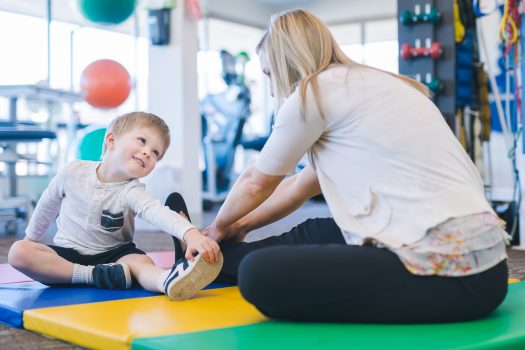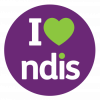
Physiotherapists work with people of all ages and abilities. This includes providing physiotherapy for children, from birth all the way up through childhood, adolescence and young adulthood.
They’ll often treat developmental disorders such as autism spectrum disorder, neurological conditions such as cerebral palsy, and musculoskeletal conditions. Physios also work with children living with genetic or congenital conditions such as Down syndrome, foetal alcohol syndrome and spina bifida, and intellectual disabilities.
Physiotherapists treat conditions that affect the way children move and go about their daily lives. The aim is to help your child with their physical and motor skills difficulties in order to improve their strength, movement and flexibility.
It’s very common for physios to work with children. A physio could start treating a child quite early in their life and continue to work with them through to adulthood. As they grow, the types of activities within sessions will change as their skills and interests develop.
What sort of work does Ability Action Australia do with kids?
The work physios do with children is very individualised and based on your child’s needs, circumstances, and the goals they want to achieve.
- For infants, we support your child with activities that help them reach their developmental milestones, such as head control, sitting, balance, crawling, and walking
- For younger children, sessions often involve play-based activities that are relevant to the child’s and parent’s goals – this makes the session more fun for the child and increases their engagement
- For older children and young people, physiotherapy sessions are developed around their interests. For example, if there is a particular sport they enjoy or if they like arts and crafts, sessions will be developed around these activities
When working with children, all our sessions are adjusted so that they become more creative, fun and engaging.
How will my child benefit from seeing a physiotherapist?
At Ability Action Australia, our physiotherapists will improve your child’s physical condition. For example, this means improved:
- Control of their movements
- Gross motor skills
- Fine motor skills
- Walking pattern
We often see and hear about improvements in the school environment due to improved fine motor skills, such as better handwriting, and other activities requiring use of their hands and fingers. Our physios also see improvements in children’s socialising skills as they gain more confidence to take part in activities they enjoy.
At Ability Action Australia, our paediatric physiotherapists also benefit from working with children! One of our senior physios, Meg Huang, says she and her colleagues tend to form really special connections with their young clients.
“The most rewarding thing about my work with kids is seeing them progress and develop throughout their lifespan, not only physically but also socially, emotionally, and mentally,” Meg says.
“You often find that you’re not only their physio, you also become a friend and a confidant who they trust and tell things to – this can be anything from their first crush, to problems they’re experiencing at school such as bullying.”
Can you give me some examples of how physiotherapy for children can help my child reach their goals?
Meg provides physiotherapy for children, working with children from variety of backgrounds. Here are a couple of examples of her work:
Child 1:
Background: A 15-year-old girl with foetal alcohol syndrome resulting in uncoordinated movements, and pain and stiffness throughout her body (especially with bed mobility and handwriting). At the initial assessment, she was able to write one short sentence before pain and cramping occurred in her hand, and to perform one repetition of getting out of bed (this was painful for her due to incorrect movement patterns and stiff joints).
Treatment: Involved arts and crafts activities, such as bracelet making, conversing via handwritten notes, Jenga, correcting her movement patterns in bed (and turning this into a 100-repetition challenge), and stretching.
Results: After four sessions, she was able to write a short paragraph before her hand hurt, and she could get in and out of bed 20 times (this is no longer painful for her, but tiring due to weak muscle endurance). After five sessions she can now write one full A4 page and she still does not get any pain or cramping in her hands or fingers. Amazing! She can also get in/out of bed 25 times without any discomfort and performs this movement daily.
Child 2:
Background: A 20-year-old man (paediatric physiotherapy involves young people up to the age of 22) with a rare neurological condition resulting in minimum use of his arms and legs. At his initial assessment, his sister reported the difficulty in helping him transfer from a seated to standing position at 7–8 on a scale of 10. He also had minimum strength in his upper body and lower body and had pain ranked at 8/10 in his lower back.
Treatment: Sessions involved teaching him how to switch on his muscles, correcting his movement patterns for sit to stands, helping him load through his legs, sensory training, electrical muscle stimulation, and manual therapy to treat his lower back pain. He was also given a home exercise program.
Results: After one session, his lower back pain was down to 2/10 and he could contract his muscles much more efficiently. After three sessions, his sister rates the difficulty in helping him to transfer to a standing position at 3/10 as he can perform more of this movement by himself due to corrected movement patterns and increased strength.
Why should a parent or carer choose Ability Action Australia for their child’s physiotherapy?
Ability Action Australia has a number of clinicians who are experienced and enjoy working with children. Our physios also want parents to be involved in your child’s sessions and in planning their treatment. We value good communication with families!
Our core values are:
- Simplicity — we make it easy for you and your child to understand what we do and why
- Tenacity — we are creative, so if one thing doesn’t seem to work for your child or they don’t enjoy it, we are happy to adapt and try another strategy until we find something they do enjoy that will help them reach their goals
- Collaboration — we work as a team to help your child get more out of life today. This includes identifying any other services your child may benefit from and setting this up
- Trust — we pride ourselves on being honest and direct. Working with children involves keeping open lines of communication between the clinician and parent
We approach every case with these same values, whether we’re providing physiotherapy for children, occupational therapy, or any other therapeutic support.
Talk to Ability Action Australia
All our physiotherapists are registered NDIS providers with experience providing services and support to people living with disability. If you have funds in your NDIS plan allocated to Capacity Building or Core Support, you can likely access our Physiotherapy services.
Contact us to find out more about our Physiotherapy service. Phone 1800 238 958 or email hello@abilityactionaustralia.com.au today!

